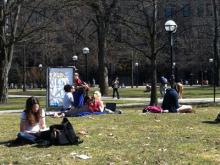Training Philosophy and Goals
Philosophy
The primary model of the UM Internship Consortium fits within a “practitioner-scholar” model. The Consortium believes that students are best trained through a series of intensive, graduated, and closely supervised, set of training activities in contemporary practices grounded in current empirical research and theory.
Service Delivery
Clinical Services
First Appointments(FA): A simultaneous process of evaluation and beginning brief work or a referral. Interns provide two FA’s each week; students seen for an FA generally continue as clients with that therapist.
Ongoing Appointments: The philosophy and policy of CAPS is to provide brief therapy, but there is no set number of or limitations to appointments. Interns, with supervisor consultation, learn to manage their client load to keep direct clinical service at approximately 50% of their work time.
Sample Schedule
| Service Delivery | hours/week |
|---|---|
| First appointments | 1.5 |
| COD (crisis/consultation) | 0-2 |
| Therapy - individual | 5-7 |
| Group/Workshop | 0-2 |
| Total | ~11 |
Learning Su
Benefits & Application ProcessBenefitsInterns are paid a stipend for each half-time year of internship of $7,200 ($14,400 for a full-time internship consisting of completing two half-time rotations simultaneously). The rotation at Counseling and Psychological Services is for a full 12 month period, beginning on the fourth Monday in August and ending on the third Friday in August Holidays follow the University of Michigan vacation schedule; sites may also close on some additional days each year. Interns, in addition, receive 2 weeks of paid vacation time each internship year. Current & Previous TraineesA listing of previous CAPS Psychology practicum trainees.
Current and Previous FellowsA listing of previous CAPS Post Doctoral Fellows.
Concerns About Student's WritingIntroduction and Context
Faculty and instructional staff are often the first to have access to students’ ways of thinking and acting. If a student’s writing seems disturbing, it’s natural for an instructor to want to respond. But an immediate or impulsive reaction may exacerbate the problem by isolating and alienating the student. Many students who hand in disturbing material would never act on the thoughts that they have put on paper. Conversely, many students act violently with no prior indication. Pagination | |



